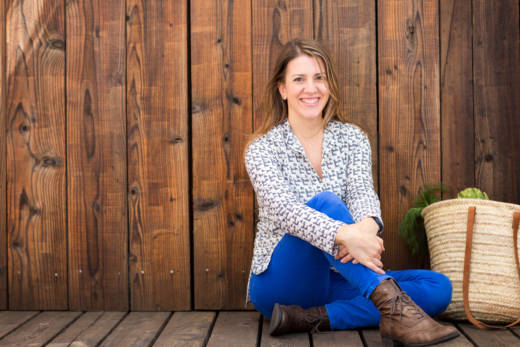There is plenty in the world to rebel against; I didn’t need to rebel against my mother’s politics. I was raised in a family with a long tradition of standing up for our principles. My grandmother on my mother’s side helped to found the first racially integrated church in Fort Worth, Texas, and my grandmother on my father’s side was a leader in the Newark teacher’s union who helped to lead a strike there in 1971 that landed her and her colleagues in jail. Since my college days, I’ve been constantly seeking ways to align my life with my core values, but it wasn’t until I was 26 that I discovered my path would be, like my mother’s, connected to exploring the root causes of hunger. That was when I was in graduate school and my brother and I had the idea that it was time for my mother to return to her original book, Diet For a Small Planet, and explore the communities, cities and social movements that are helping to create more sustainable and just food systems. The book that came out of that, Hope’s Edge, is what really set me on my path.
Was Real Food Media a natural offshoot of the Small Planet Institute or did it have an altogether different genesis? How do the two organizations work together on food-justice issues?
Real Food Media was a natural outgrowth of this work. The project’s mission is to change the narrative about food, elevating the story of sustainable farming, farmers and food workers, while exposing the true costs of industrial agriculture. The ultimate outcome is to motivate more people to not only change how they think about the food they eat, but how they think about the role they can play in shaping the system that determines what food is available to them and how it’s produced.
We synthesize the complex ideas of food system change and translate them for the general public, empowering groups to own their own messages and develop vehicles to get those messages out. Real Food Media focuses on several core programs, including an international short films competition, a myth-busting resource center and partnerships with allied organizations.
In a communications context, where the food industry spends millions on marketing and public relations, we work to combat this misinformation by being a clear voice for the sustainable food movement, popularizing complex ideas and policy for a general audience. While this work, and other efforts of the food movement to tell these stories, will never have the marketing dollars that the food industry has, it is grounded in grassroots organizing, and the results have been extremely effective.
Together, the two organizations have published books, delivered hundreds of lectures and participated in more than 100 conferences and community events since we started in 2001.
It's great that the James Beard Foundation has recognized your work with a 2016 Leadership Award. How, for you, is food tied to other basic human rights?
Food is at the very heart of human rights—and freedom. Our ability to feed ourselves and our communities with nutritious, culturally appropriate food is central to life.
What is the most critical work you see yourself being involved in over the next five years?
Over the next five years, I’m really excited to be part of three big campaigns: First, to promote the power of agro-ecological solutions worldwide to create more resilient food systems in the face of climate change and reduce the environmental impact of farming globally. Second, to join forces with people around the country—and the world—to take on the soda industry with initiatives like the soda taxes that have the power to reduce consumption of these harmful beverages and generate revenue for health education and diabetes-reduction programs. Third, to be involved with the coalition nationwide to win passage of “good food purchasing policies” in cities across the country. These procurement polices support city governments and school districts to look at their purchasing power through the lenses of five values: environmental sustainability, local economic development, worker rights, animal welfare, and nutrition. There is nearly limitless potential for these procurement policies to shift hundreds of millions of dollars every year toward the food production that’s better for people and the planet.
How can individuals get involved, both on a personal level and a more public, even political one?
What I love about working on food system change is that people can get involved in so many different ways and on so many levels. With the growth in the market for more sustainable and local food, more and more people are able to make diet choices that connect them to the values of health, environmental sustainability, regional economic growth, worker wellbeing, and animal welfare, for example.
Of course, many people still can’t make the choice for organic and locally owned food—because they don’t have either the resource or the access—but everyone can cut soda out of their lives. And that one choice has been found to have huge benefits, not only in money-saving, but improved health as well. Sugary drinks are the single largest source of sugar in our diet, and drinking just one or two sugary drinks per day can increase the chances of developing type 2 diabetes by 26 percent.
But the biggest way we can have an impact is not through our actions as consumers, but through our voice as voters and community members. We can elect officials who stand up for workers and condemn those who protect polluting factory farms, for example. Groups like Food Policy Action provide us with transparency on where our leaders stand.
We can also speak up for policy change that can really make a difference, like food procurement policies that reflect shared values, farm-to-school programs in our cities, or food access initiatives that connect those in need with real food, not processed junk food.
If Hillary Clinton is elected president, what do you see as her top policy priorities around food?
